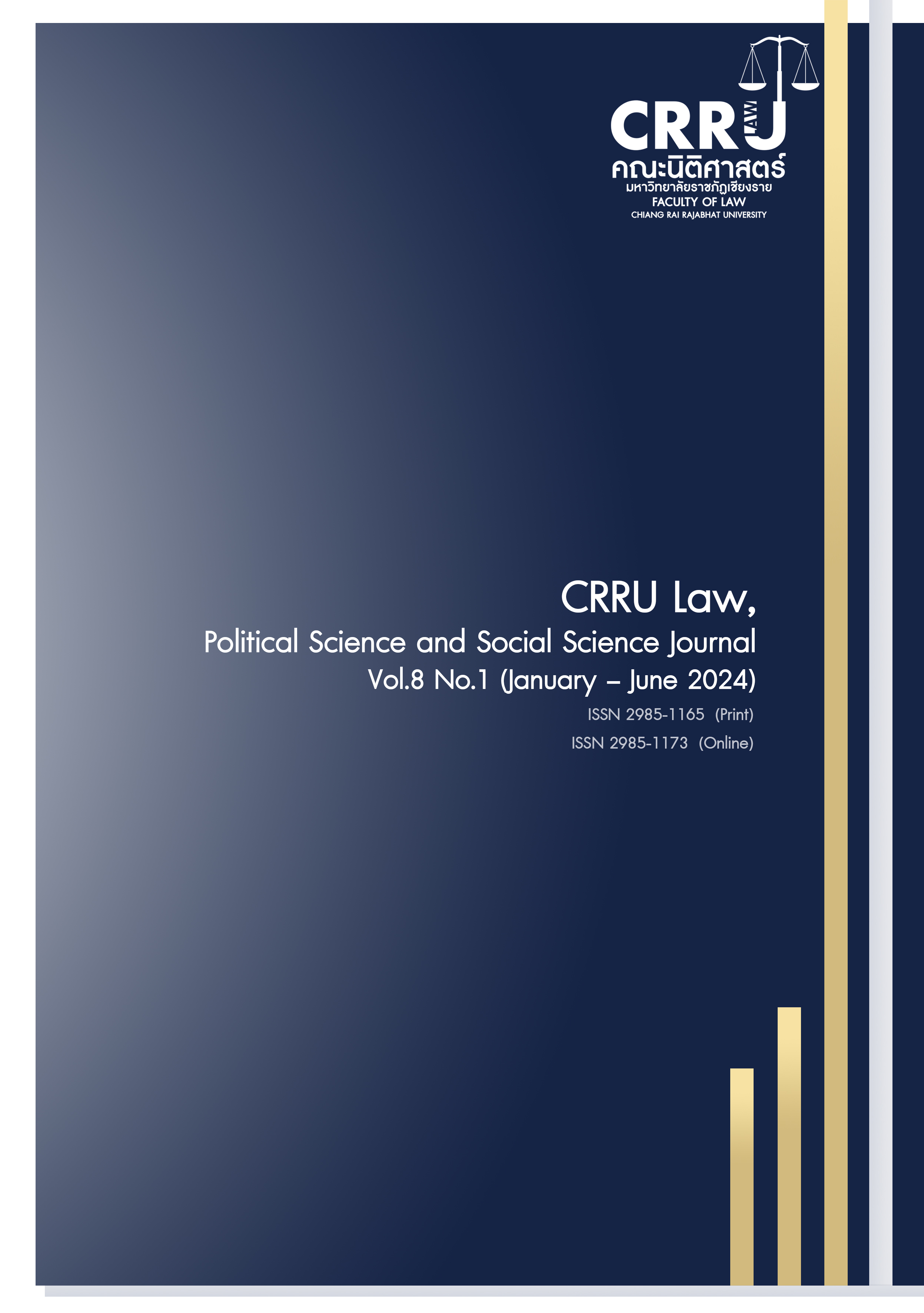The Crucial Roles of Teaching Constitutional Law in Higher Education Institutions in Developing Thailand’s Democracy
Main Article Content
Abstract
The teaching of constitutional law in higher education institutions is an important learning process that helps law students learn about administrative procedures, the rights and freedoms of citizens. This is because the Constitution is a body of basic laws and a main legal framework that establishes the basic structure of the state, the rights and freedoms of the individuals in each nation. Students’ understanding and knowledge of the Constitution is of utmost importance in promoting an in-depth comprehension of the state’s jurisprudence and governance. Thus, students are required to study the origins of basic principles of constitutional law, and the history of the development and changes of the Constitution, and establish judicial order in the state’s government in accordance with the Rule of Law, which determines rules and regulations for living in society.
Designing the teaching of constitutional law or the constitution can be done in diverse patterns, for instance, explaining legal principles and theory, creating realistic legal situations, and studying social and legal impacts related to the Constitution. In addition, adapting legal principles to various situations that arise in everyday life, students can apply them in real life and future work.
The Constitution of the Kingdom of Thailand B.E. 2560 (2017), we will find that there are important legal provisions that every individual, as a citizen of the country, is required to know to use them to protect their own rights and duties. Therefore, if teaching constitutional law to students of each program are done by higher education institutions, it will deliver and promote the understanding of important contents and principles of the Constitution, which is the supreme law of the Kingdom of Thailand and stipulated to be the basic laws to protect individual rights which will lead to the development of democracy in Thailand correctly and sustainably."
Article Details
References
ฉัตรทิพย์ นาถสุภา. ประสบการณ์และความเห็นบางประการของรัฐบุรุษอาวุโส ปรีดี พนมยงค์ สัมภาษณ์โดย ฉัตรทิพย์ นาถสุภา. กรุงเทพฯ: สถาบันปรีดี พนมยงค์, 2542.
เฉลิมชัย ก๊กเกียรติกุล. “การแก้ไขรัฐธรรมนูญของสหรัฐอเมริกา.” 2557. http://chalermchai-nbtc.blogspot.com/2014/05/blog-post_12.html. สืบค้นเมื่อ 10 เมษายน 2566.
ฐากูร ศิริยุทธ์วัฒนา. กฎหมายรัฐธรรมนูญ: หลักพื้นฐานแห่งกฎหมายรัฐธรรมนูญและระบอบประชาธิปไตย. พิมพ์ครั้งที่ 3 แก้ไขเพิ่มเติม. กรุงเทพฯ: วิญญูชน, 2565.
แถมสุข นุ่มนนท์. ยังเติร์กรุ่นแรก กบฏ ร.ศ.130. พิมพ์ครั้งที่ 3. กรุงเทพฯ: สายธาร, 2545.
ทวียศ ศรีเกตุ. “รัฐธรรมนูญกับด้านการศึกษาในยุค 4.0.” https://www.parliament.go.th/ewtadmin/ewt/elaw_parcy/ewt_dl_link.php?nid=1743. สืบค้นเมื่อ 19 เมษายน 2566.
นรนิติ เศรษฐบุตร. สารานุกรมการเมืองไทย. กรุงเทพฯ: สำนักงานเลขาธิการสภาผู้แทนราษฎร, 254.
บุญศรี มีวงศ์อุโฆษ. กฎหมายรัฐธรรมนูญ. พิมพ์ครั้งที่ 9. กรุงเทพฯ: บริษัทวิญญูชนและศูนย์หนังสือมหาวิทยาลัยธรรมศาสตร์, 2559. 231. อ้างถึงใน ศึกฤทธิ์ ปราโมช. ฝรั่งศักดินา. กรุงเทพฯ: หนังสือพิมพ์ก้าวหน้า, 2504.
บวรศักดิ์ อุวรรณโณ. คำบรรยายวิชากฎหมายรัฐธรรมนูญ. กรุงเทพฯ: สำนักอบรมศึกษากฎหมายแห่งเนติบัณฑิตยสภา, 2554.
พระองค์เจ้าวรรณไวทยากร วรวรรณ. รวมวิทยาการท่านวรรณฯ. พระนคร: โอเดียนสโตร์, 2494.
พรชัย เลื่อนฉวี. กฎหมายรัฐธรรมนูญและสถาบันการเมือง. กรุงเทพฯ: มหาวิทยาลัยธุรกิจบัณฑิต, 2550.
มีชัย ฤชุพันธ์. “ชี้ต้องมีการปฏิรูปการศึกษา ใช้คนนอก ปรับโครงสร้างศธ. ทำงานตามนโยบายภาพรวม.” 2560. https://www.matichon.co.th/education/news_445940. สืบค้นเมื่อ 27 ธันวาคม 2566.
มีชัย ฤชุพันธ์. “ส่งสัญญาณแนะปฏิรูปการศึกษาให้สำเร็จ.” 2560. https://www.komchadluek.net/NEWS/EDU-HEALTH/258244.
สืบค้นเมื่อ 25 ธันวาคม 2566.
ลิขิต ธีรเวศิน. การเมืองการปกครองของไทย. พิมพ์ครั้งที่ 6. กรุงเทพฯ: มหาวิทยาลัยธรรมศาสตร์, 2545.
วิชา มหาคุณ. “ระบบศาลในสมัยกรุงรัตนโกสินทร์ตอนต้น”, ที่ระลึกนิทรรศการทางการศาลสมโภชกรุงรัตนโกสินทร์ สองร้อยปี เมษายน 2552. กรุงเทพฯ: กระทรวงยุติธรรม, 2552.
วิชาญ ทรายอ่อน. “บทบัญญัติด้านการศึกษาตามรัฐธรรมนูญแห่งราชอาณาจักรไทย พุทธศักราช 2560.” 2561. https://www.parliament.go.th/ewtadmin/ewt/parliament_parcy/ewt_dl_link.php?nid=51901&filename=thai_national_assembly. สืบค้นเมื่อ 15 มีนาคม 2566.
อัชนา ไชยชนะ. “ปัญหาเกี่ยวกับวัตถุแห่งคดีในการใช้สิทธิยื่นคำร้องต่อศาลรัฐธรรมนูญ ตามรัฐธรรมนูญแห่งราชอาณาจักรไทย พุทธศักราช 2560 มาตรา 213 : ศึกษาเชิงพัฒนาการทางกฎหมายในการนำระบบการร้องทุกข์ทางรัฐธรรมนูญมาใช้ในประเทศไทย.” วารสารนิติศาสตร์ มหาวิทยาลัยทักษิณ 10, ฉ.12 (มกราคม-ธันวาคม 2565): 20-21.


